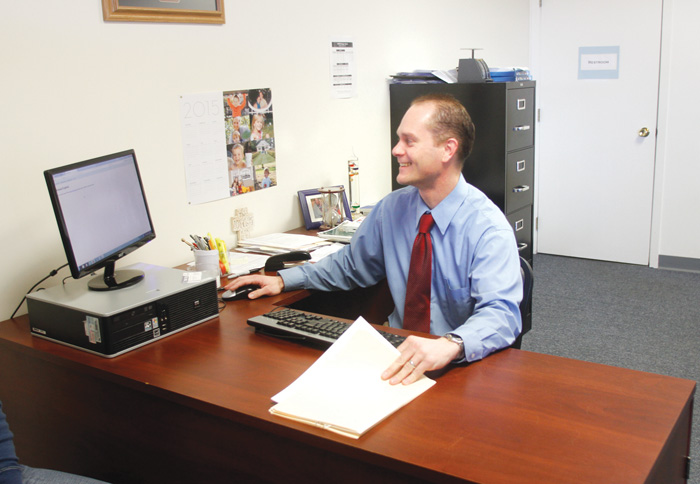Tax preparation industry adjusts to past changes


Andrew Reigstad, owner of Tax 29 at 1313 Boardman-Poland Road in Boardman, is busy as the tax season hits the homestretch.
YOUNGSTOWN
The tax-preparation industry has adjusted to some income-tax changes with the deadline for the filing season a month away, area tax preparers said.
One of the major changes was the transition from paper to electronic filing in 1987, said Janice Krapacs, owner of James Income Tax Service, 4118 Parkman Road NW, Warren, which was founded in 1963 by her father. She took ownership in 1977.
“I’ve been e-filing since 1988,” Krapacs said.
The Internal Revenue Service required tax preparers to e-file returns along with other mandatory measures in 2011.
Paid tax preparers also were required to register for a nine-digit identification number, take a competency test and undergo a tax- compliance check and a suitability check. They also were required to take 15 hours of continuing education each year.
Those who met the requirements would become a registered tax-return preparer, but certified public accountants, attorneys and enrolled agents were exempted.
Krapacs said those measures reduced the number of small and independent preparers. “There are just a handful of us,” she said.
The U.S. District Court for the District of Columbia overturned the mandatory measures in January 2013, although preparers still were required to register. The decision was upheld in the U.S. Court of Appeals in February 2014.
The IRS then made the requirements voluntary. The IRS provides an online directory of those who volunteered in the program. As of this year’s filing season, there are 666,000 tax preparers who have a registered identification number. Before mandatory measures were implemented, the IRS said there were about 900,000 to 1.2 million tax preparers in the nation.
“It’s going to be required [again] in the next year or two,” CJ Green, owner of CJ Green Tax Service, said of the tax-preparer measure.
After being in business for a year, Green moved her work, a few months ago, to the Urban Office Space on the fourth floor of the 16 Wick Building on Wick Avenue in downtown Youngstown. She has a bachelor’s degree in accounting from Youngstown State University, and received her master’s degree in the same field from Liberty University in Virginia last year.
Green was among the displaced employees of First Place Bank, which was acquired by Talmer Bank and Trust in 2013. Green had a choice to relocate to Michigan, where Talmer is located, or find another job.
“This was kind of my push,” she said.
From 2009 to 2014, Green prepared taxes as a side job, and started her own firm for the 2014 tax-filing season. Business has been “steady,” she said.
Another big change in filing tax returns involves the Affordable Care Act.
The ACA, better known as Obamacare, requires people to purchase health insurance, largely through tax credits. According to the Brookings Institution, people must report their insurance status on their 1040s, and if they have no coverage, must pay penalties. Those whose subsidies turned out to be too high or too low must reconcile those payments when they file their returns.
“That law has been the biggest change,” said Andrew Reigstad, owner of Tax 29.
His father founded the business in Simi Valley, Calif., in 1984. Despite the changes, business hasn’t slowed down for Reigstad. He joined his father in 1997, and together moved the company two years later to Los Angeles. His dad retired in 2012.
Reigstad moved with his wife to her hometown, Youngstown, and opened another location for Tax 29, 1313 Boardman Poland Road in Boardman, in 2008.
While the busiest time for tax preparers is February, Reigstad said it declines dramatically after April.
 43
43
